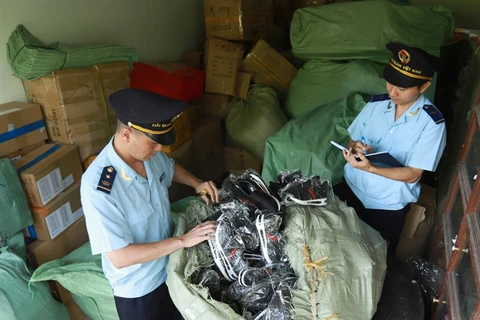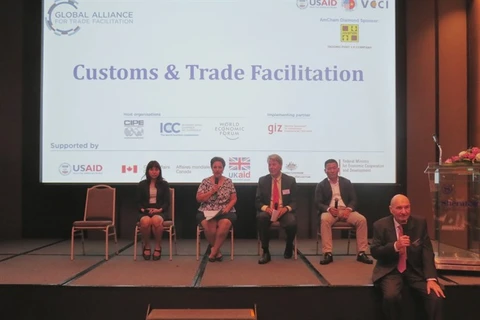 The application of customs bond could help increase import-export turnover by 1 percent. Illustrative image (Photo: VNA)
The application of customs bond could help increase import-export turnover by 1 percent. Illustrative image (Photo: VNA)
Hanoi (VNA) – Based on experts’ assessment and other countries’ experience, the application of customs bond could help increase import-export turnover by 1 percent.
Instead of having to wait for completion of tax and fee payment as well as specialized inspections, firms covered by customs bond can get their goods before completing customs clearance procedures.
This will help cut costs and increase business opportunities for firms, according to Deputy Director General of the General Department of Vietnam Customs (GDVC) Mai Xuan Thanh.
The GDVC Deputy Director General talked in depth to the press on the pro and con of customs bond on the sidelines of the workshop on customs bond for imported and exported goods on April 5.
Question: The GDVC is working on a project piloting customs bond. Can you explain what customs bond is?
GDVC Deputy Director General Thanh: The mechanism of customs bond allows firms to take their goods out for use without having to wait for completing tax and inspection obligations. Under this mechanism, firms sign contracts with an insurance organization, and that organization will guarantee that the firms will fulfill all obligations.
This offers more opportunities for firms. In the past, banks were the only choice for firms when they wanted to get tax bond. But now they can have another choice which is insurance organisations.
Insurance organisations’ operation deals with risks, which means many firms have opportunities to access them. Firms do not necessarily have mortgage assets. Insurance organisations will analyse firms’ operation and ability to pay instead of only focusing on their assets. Therefore, more firms will have access to the bond.
On the part of State management agencies, the customs bond mechanism ensures the collection of tax and completion of specialized inspection while reducing costs and the pressure of having to complete all procedures at the time of customs clearance.
Based on experts’ assessment and other countries’ experience, the application of customs bond could help increase import-export turnover by 1 percent, and enhance competitiveness for import-export companies in the region and the world.
-What is the advantage of the later submission of C/Os and specialized inspection licences in reducing customs clearance time?
GDVC Deputy Director General Thanh: Some C/Os and specialized inspection licences must be submitted when doing customs clearance procedures, if firms cannot produce them, they will not get their goods out. This will push business costs up, while many business opportunities may be lost, and production cannot be continued. Those cost firms a lot which cannot be measured. Only firms know how much they lose from lost business opportunities or failure to deliver goods on time. The firms will compare such losses with the cost of customs bond to decide which option they want.
I think they will certainly choose customs bond so that they can quickly get their goods out of customs. They will then fulfill the obligations with competent agencies and hand over the dossiers to the customs to complete clearance procedures.
-The advantage is great, but associated risks are not low. What do you think about this?
GDVC Deputy Director General Thanh: With this mechanism, management agencies are sure they will be able to collect taxes and fines if firms fail to complete obligations. Meanwhile, the insurance organisations have accepted the risks of firms failing to pay. This means the risks are transferred from State agencies to insurance organisations.
Insurance organisations’ business deals with risks. They have calculated the possibility of risks and profits, thus preventing risks for State agencies.
 Deputy Director General of the General Department of Vietnam Customs (GDVC) Mai Xuan Thanh
Deputy Director General of the General Department of Vietnam Customs (GDVC) Mai Xuan Thanh(Photo: VietnamPlus)
-In order to pilot the mechanism, what are the next steps of the customs sector to allow firms to participate in the mechanism?
GDVC Deputy Director General Thanh: After the pilot implementation, we will review and clarify the benefits for firms. On the part of management agencies, we will also assess the loopholes and the firms’ needs for support, so that all firms will abide to the law when joining customs bond. Those firms which fail to adhere to the law will be punished in accordance with existing regulations.
The project on customs bond is divided into three phases:
-Pilot phase (2021-2022): selective application for some types of activities such as business tax, transit goods, temporary import for re-export, delayed submission of C/O, taking out of goods for preservation.
-Extended phase (2022-2023): extending the pilot application of customs bond to other goods of temporary import for re-export such as products used for exhibitions and fairs, imported products for maintenance or reparation, construction…; or goods needed preservation pending import licences in some fields.
-Official phase (scheduled from 2024): officially implementing customs bond for other types of import-export goods such as sub-contracted goods, for-export processed goods, export goods and others./.





















